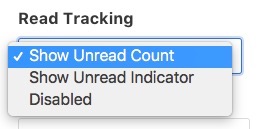-
-
-
-
-
-
Provide an option to return only unread entries in a timeline
By default, a call to retrieve the timeline will still return already-read entries. However, in certain cases, such as if there are lots of unread entries and you start reading them from newest to oldest, or if somehow an entry was added far back in the timeline, you might want to see only the unread items.continue reading... -
Improve reply contexts
Improve reply contexts by inspecting the reply URL, as documented on https://indieweb.org/reply-context#Minimal_text_reply_contextscontinue reading... -
-
-
generate autolinked HTML for plaintext posts
if a post only has plaintext, then Aperture should autolink it and provide an HTML version of the post for clients that want to display HTML.continue reading... -
store mapping between channels and default micropub destinations
in the channel settings, provide a dropdown to select the default micropub destinationcontinue reading... -
add support for mp-destination
query the micropub endpoint and store the destination list in the sessioncontinue reading... -
-
-
-
Child mf2 objects are missing
Currently the parser is dropping child mf2 objects, such as when there are child h-entrys under an h-feed.continue reading... -
-
-
-



